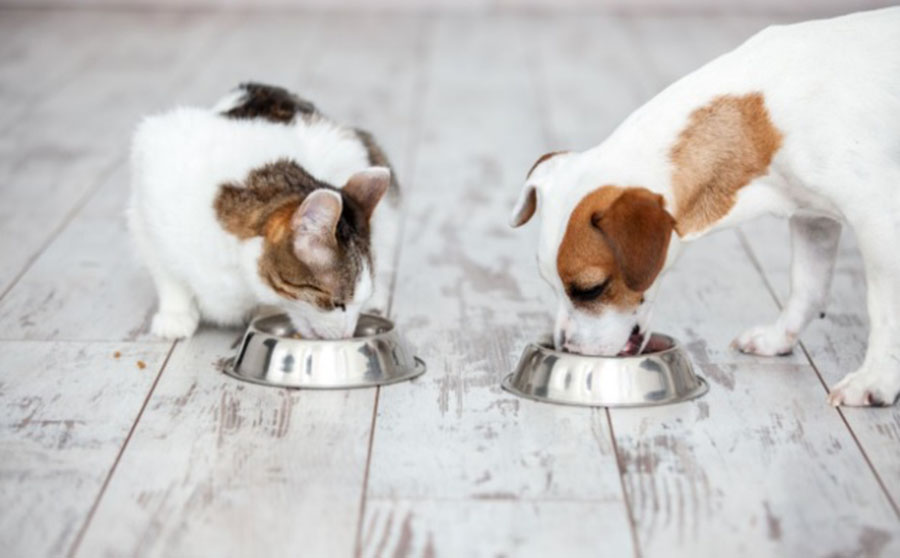This concept of feeding pets with raw meat is entirely wrong, as several European veterinarians and scientists have assured. According to the new study released Thursday, people shouldn’t believe that the best way to feed their cats and dogs is with uncooked food. This method has high chances to contain bacteria, making it dangerous to the four-legged friends and their owners.
This study was published in the BMJ’s Vet Record and led by Paul Overgaauw, from the Utrecht University. It’s not the first paper that calls owners to formulate better diets for their pets than raw meat, bones, and organs.
Although the research was done by scientists in the Netherlands with pet food from that country, the experts assured that there’s a large number of products commercially available in the US and across the EU that share “without a doubt” plenty of similarities.

Owners are preferring to feed their pets with raw food because they think it’s more “natural” for them. They believe that, unlike processed food, raw food is not contaminated and has no additive. That would be a great solution to avoid skin problems and allergies. However, it’s not as simple as it sounds.
The problem with raw food is that it allows plenty of microscopic germs and bacteria that can’t be killed by pure water. The only way is to submit them to high levels of heat, which is precisely what happens when it’s cooked.
Additionally, this team suggested that there’s no research supporting the benefits of raw meat diets. In fact, they showed that they could lead the pets to suffer from dental and gut injuries, as well as growth problems –produced due to a deficiency in certain nutrients, something usual in pets fed of home-prepared raw meat diets.
“We see that more and more people are feeding [cats and dogs] this kind of product and we know that meat is infected with bacteria and parasites,” Paul Overgaauw told The Guardian.
Daniel Chan, an emergency and critical care professor at the Queen Mother Hospital for Animals, who was not involved in the research, said that there’s “any scientific evidence to support” this belief.
Raw food full of bacteria
After all the warning made in America when scientists found that raw food is dangerous for both people and pets, Overgaauw decided to start a new study but across Europe. The Netherlands, as he explained, is a country where more than a half of owners feed their pets with raw food – at least partially.

The experts analyzed 35 frozen products across eight brands, made for cats and dogs, and commercialized throughout the Netherlands. They searched for evidence of bacteria and germs and ended with striking findings.
The team found that these products contained a large number of pathogens – like salmonella, listeria and E. coli.
Referring to E. coli, they wrote that 23 percent of the studied products could lead humans to suffer from renal failures. Also, they saw that 80 percent of them had antibiotic-resistant E. coli.
More than 50 percent of the products contained listeria species present, 23 percent had Sarcocystis – a parasite that causes anorexia, nausea and abdominal pain -, 20 percent had salmonella and 6 percent Toxoplasma gondii – which, among its risk, can affect babies.
The researcher said that the parasites affect neither humans nor pets if the products are frozen. However, freezing them doesn’t kill the bacteria, so they still represent a threat.
To raise concerns throughout the population
To raise awareness across the people, the scientists believe it’s better to label the meat diets to highlight how harming they are to our little friends and us.
“We have known that there are risks associated with raw meat feed diets since the early 2000s, but this is the first [research] in Europe that has gone as far as to check commercially available frozen raw meat diets,” said Daniel Chan. “The most concerning from our public health point of view is that they are finding multi-drug resistant bacteria in the food source.”

Chan also said that this study could help people understand how important is to feed their pets with commercial and processed products than with home-prepared food. To him, the “most concerning from our public health point of view” is the researchers found “multi-drug resistant bacteria” among the 35 products gathered.
The professor explained that the meat people buy at the supermarket can make them sick if they don’t cook it because it has bacteria.
“There hasn’t been any evidence to show [if] an animal has an allergy problem, that allergy is best treated with raw food products,” he added. “We don’t have any scientific evidence to support those claims.”
Source: Veterinary Records
